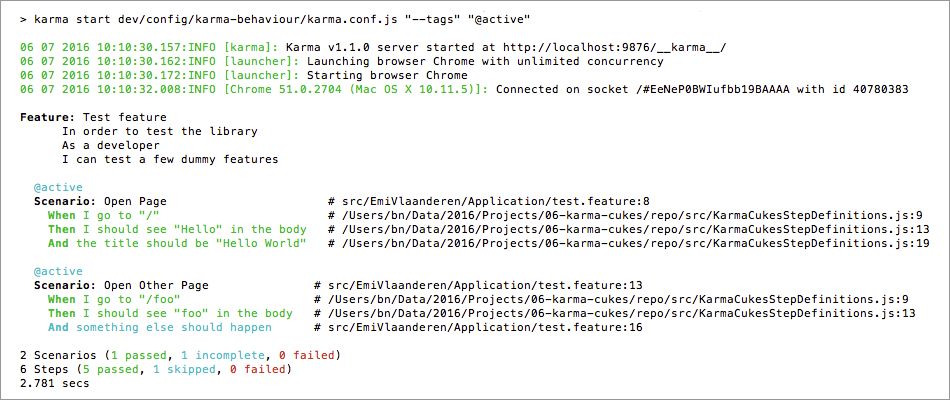Karma-Cukes
Karma plugin for running Gherkin feature files against CucumberJS in end-to-end tests.
Idea
- Karma is a developer-friendly tool for running tests in real browsers, with direct access to client-side markup and code (without needing a Selenium tunnel).
- CucumberJS enables end-to-end tests and stakeholder-friendly, living documentation.
Bringing these two together could simplify the development workflow from story to spec through a unified set of tools.
Main features of this Karma plugin
- Comes bundled with "Progress", "Pretty", and "JSON" reporters that are more in line with the official Cucumber reporters (no HTML reporter yet, this package is more targeted at command-line users).
- The API and syntax for registering step definitions and other support code is compatible with CucumberJS
(i.e. step definition files can use
module.exports). - Native access to the browser, jQuery, etc.
- A single toolkit for both Story BDD and Spec BDD.
- Tested with Chrome, Firefox, PhantomJS
Existing alternatives
Selenium/Webdriver with built-in CucumberJS framework
While Webdriver (Selenium) offers near out-of-the-box support for Cucumber, the generated reports lack the level of detail that "native" Cucumber provides. They don't allow to auto-generate living documentation from report files (e.g. feature descriptions are missing and both feature and scenario names get normalized to underscored identifiers).
Other Karma-CucumberJS adapters
They basically have the same issues as Webdriver-Cucumber. There are good jUnit-reporters but I could not find proper "Progress", "Pretty", or "JSON" formatters that behave like the ones a Cucumber (or Behat in my case) developer is used to. The ones I tested also did not work with PhantomJS and Firefox.
Solution
The two main options were:
- writing a custom adapter + custom Cucumber-compatible reporters for Webdriver, or
- writing a custom adapter + custom Cucumber-compatible reporters for Karma.
This package goes for the second option, which –from looking at available adapters—, seemed to be the lower-hanging fruit. I'm not so sure about this anymore after writing the plugin, but here we are ;-)
Limitations compared to Webdriver
-
Only PhantomJS offers an API for taking screenshots through Karma (AFAIK), while Webdriver provides this feature for all browsers.
-
The Browser reports are not fully identical, e.g. PhantomJS and Firefox report step locations instead of step definition locations (due a patched
Error.captureStackTrace). -
There is only a minimal Browser API for visiting URLs in end-to-end tests. The rest is native browser access and up to you (which I personally think is actually an advantage).
-
No access to response headers (except for AJAX-based requests), but could be doable via Service Workers
-
For each non-CORS-enabled target server to be used in end-to-end tests, a proxy needs to be defined in the Karma configuration file.
Installation
npm install karma-cukes --save-dev
Peer dependencies: jquery (any version), cucumber (1.*), and of course karma (any version)
Configuration (karma.conf.js)
config.set({
// activate framework
frameworks: ['karma-cukes'],
// specify feature files and support code
files: [
{ pattern: 'dev/**/*.feature', included: false, watched: true, served: true },
{ pattern: 'dev/**/hooks.js', included: true, watched: true, served: true },
{ pattern: 'dev/**/step-definitions.js', included: true, watched: true, served: true }
],
// forward command line arguments to CucumberJS
client: {
args: process.argv.slice(4),
captureConsole: true
},
// activate reporters (kc-progress, kc-pretty, and/or kc-json)
reporters: ['kc-pretty', 'kc-json'],
// configure the JSON formatter
kcJsonReporter: {
outputDir: 'dev/reports/behaviour',
outputFile: 'karma-cukes-{shortBrowserName}.json' // supported placeholders: `shortBrowserName`, `browserName`
},
// enable colors in the output
colors: true,
// proxy test server requests for end-to-end testing
proxies: {
"/": "http://localhost:8889/"
},
// use a root URL for the karma runner that does not interfere with proxied sites
urlRoot: "/__karma__/",
...
})
Running features
// all scenarios
$ ./node_modules/.bin/karma start path/to/karma.conf.js
// tagged scenarios
$ ./node_modules/.bin/karma start path/to/karma.conf.js -- --tags @ui
Assertion utils
Karma-Cukes comes with 3 (basic) assertion methods that are accessible from step definitions.
this.assert.ok(condition, callback, message)this.assert.equal(actual, expected, callback, message)this.assert.contain(haystack, needle, callback, message)
Using the Browser object
The World context provides a Promise-based browser interface for loading local (proxied) paths or CORS-enabled URIs:
var world = this;
this.browser
.url('/my/path')
.then(function () {
var window = world.browser.window; // native browser window (an iframe)
var document = world.browser.document; // native browser document object
var $title = $(document).find('title'); // just use jQuery from here on
var pageContent = $(document).text();
...
})
// wait for an element to appear
.then (function() {
var $form = $(world.browser.document).find('#my-form');
$form
.find('input#search').val('cucumber').end()
.find('button[type="submit"]').click();
;
return world.browser.waitFor('#search-results');
});
AJAX requests can be issued as well:
var world = this;
this.browser
.http('my/api', 'GET', { search: 'cucumber' })
.then(function(response) {
var $xhr = world.browser.$ajax;
if ($ajax.status === 200 && $ajax.getResponseHeader('Content-Type').match(/application\/json/)) {
return JSON.parse(response);
}
})
Built-in Step Definitions
Karma-Cukes provides basic step definitions to get you started:
I go to "$path"- Calls
browser.url - Example:
When I go to "/test"
- Calls
I should see "$html" in the "$element" element- Calls
assert.contain $elementcan be a tag name or a CSS selector- Example:
Then I should see "Hello" in the "body" element
- Calls
the "$element" element should be "$expected"- Calls
assert.equal $elementcan be a tag name or a CSS selector- Example:
And the "title" element should be "Hello World"
- Calls
Formatters
Karma-Cukes has 3 built-in reporters:
-
"kc-progress"

-
"kc-pretty"

-
"kc-json"
[{ "id": "test-feature", "uri": "path/to/test.feature", "name": "Test feature", "description": " In order to test the library\n As a developer\n I can test a few dummy features", "line": 3, "keyword": "Feature", "tags": [ { "name": "@active", "line": 2 } ], "browser": "Chrome 51.0.2704 (Mac OS X 10.11.5)", "elements": [ { "id": "test-feature;open-page", "name": "Open Page", "line": 8, "keyword": "Scenario", "type": "scenario", "tags": [ { "name": "@active", "line": 2 } ], "examples": [], "steps": [ { "keyword": "When ", "name": "I go to \"/\"", "line": 9, "match": { "location": "/path/to/KarmaCukesStepDefinitions.js:9" }, "result": { "status": "passed", "error_message": "", "duration": 276000000 }, "log": [] }, ... ] } ... ] } ... ]
License
The MIT License (MIT) / Copyright 2016 Benjamin Nowack